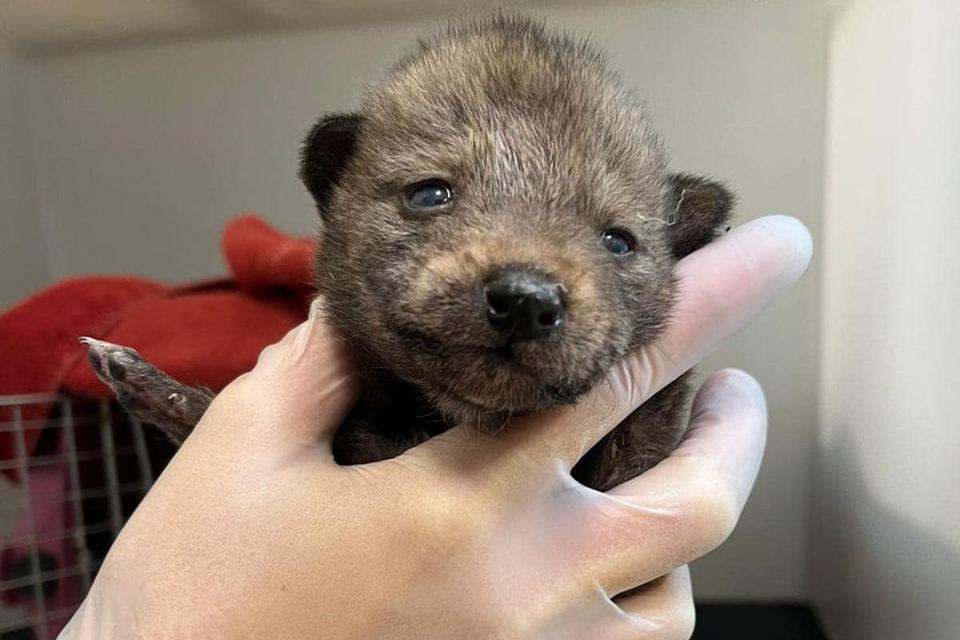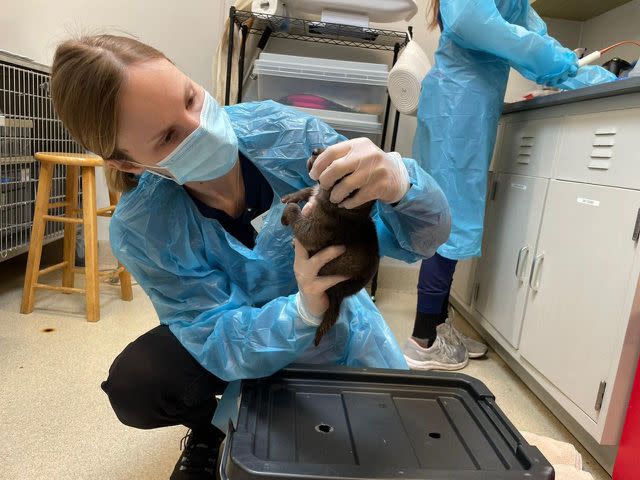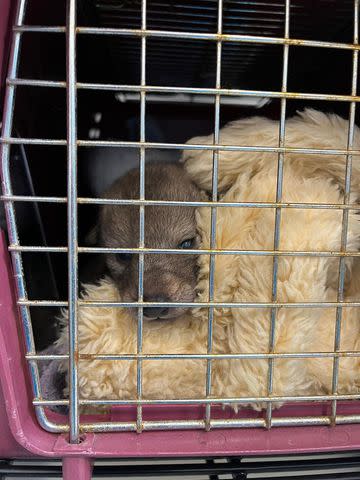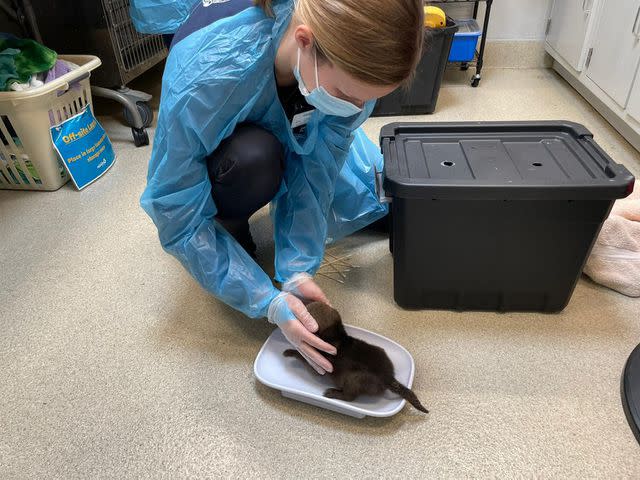Pet Rescue Shares Warning About Wild Baby Animals After Family Brings in 4 Coyote Pups
"Often, the absence of a parent doesn't mean the baby has been abandoned," the San Diego Humane Society shared

San Diego Humane Society/Facebook
One of the young coyote pups brought into the San Diego Humane SocietyThe San Diego Humane Society is caring for four young coyote pups found under the deck of a family's home.
On March 27, the shelter shared on Facebook that "four young coyote pups were brought to our Project Wildlife program after being discovered under the deck of a home in Pacific Beach," California. The baby animals are now in the capable hands of the caretakers at the humane society's Project Wildlife program.
"Because our Project Wildlife team is unable to release the pups to their original location or to reunite them with their parents, these pups will need to be raised in captivity until they are old enough to be released into the wild," the San Diego Humane Society added on social media.
The nonprofit used the coyote pups' arrival as an opportunity to remind animal lovers of the best way to handle wildlife encounters.
"While this situation is unfortunate, it serves as a valuable reminder that the best place for baby wildlife is with their parent(s)! Often, the absence of a parent doesn't mean the baby has been abandoned. If you find a litter of wild animals, it's crucial to leave them undisturbed while giving the parents time to return," the organization continued on Facebook.

San Diego Humane Society/Facebook
A San Diego Humane Society staff member examining a coyote pupThe San Diego Humane Society clarified that in the case of the four coyote pups who just arrived, it believes the family who brought them in "made the best decision possible under the circumstances." According to the shelter's Facebook post, the location of the coyote's den — underneath the deck of the family's home — presented "significant challenges" for the animals and the humans involved.
"The resident family took steps to resolve the issue using the types of humane deterrent methods recommended by wildlife professionals. However, the family's safety became a concern when, after leaving the animals undisturbed for the past 2 weeks, altercations occurred between the adult coyote and the family's dog and [an] elderly family member. With small children in the home and their front door unsafe to use, the family understandably needed to remove the pups," the San Diego Humane Society added in its post.
Related: Animal Intruder Mistaken for a Wolf Turns Out to Be a Lonely Dog Looking for Love
In circumstances where encounters with wild animals, especially newborn critters, aren't so precarious, the shelter recommends giving animals space.
"During the spring baby season, coyotes give birth and begin to raise litters, which are often found near their dens or burrows. Coyote pups are only in the den for 3-4 weeks, before they venture out. If the parents feel their young are threatened, they will move their pups to another den site. Often times the parents have already picked a new den site, but they wait until nighttime to safely move their pups," the humane society explained.

San Diego Humane Society/Facebook
A coyote pup removed from a den under the deck of a California homeThe shelter also noted that coyotes often avoid humans, but the aromas of trash, pet food, and compost can attract coyotes to more populated areas. The San Diego Humane Society recommends people in areas with coyotes keep "all food and water indoors" and trash "in high-quality containers with tight-fitting lids."
Related: Baby Hedgehog Rescued by 'Well-Meaning' Woman Turns Out to Be a Pom-Pom
"If you encounter a coyote, using hazing techniques (such as yelling and waving your arms, making noise with pots and pans, or using a whistle or air horn) can effectively discourage their presence," the nonprofit recommended, adding, "By using proactive measures and understanding the natural behaviors of coyotes, we can coexist with our wild friends while safeguarding both their welfare and ours."
The four coyote pups under the San Diego Humane Society's care will be transferred to the Ramona Wildlife Center, "where they will grow until they are healthy enough to be released back to the wild," according to the organization.

San Diego Humane Society/Facebook
A San Diego Humane Society staff member weighing a coyote pupNever miss a story — sign up for PEOPLE's free daily newsletter to stay up-to-date on the best of what PEOPLE has to offer, from celebrity news to compelling human interest stories.
The San Diego Humane Society ended its Facebook post with a message to animal lovers concerned about the mother of the coyote pups.
"We recognize that community members are concerned about the welfare of the mother coyote," the humane society wrote. "We have consulted with the California Department of Fish & Wildlife (CDFW) as they are the agency with the authority to manage wildlife. They have advised us that reuniting the family or relocating the mother are not viable options. While we understand the community's concern, this healthy adult coyote will likely mate again soon and have another litter of pups to care for. If you have concerns about the coyote or would like to report sightings, please contact CDFW through their online form at https://apps.wildlife.ca.gov/wir."
For more People news, make sure to sign up for our newsletter!
Read the original article on People.

 Yahoo Lifestyle
Yahoo Lifestyle 
